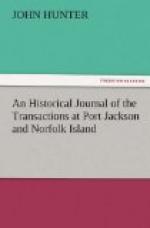With respect to religion, we have not been able yet to discover that they have any thing like an object of adoration; neither the sun, moon, nor stars seem to take up, or occupy more of their attention, than they do that of any other of the animals which inhabit this immense country.
Their dead they certainly burn, of which I have been well convinced lately, when employed on the survey of a distant branch of Port Jackson. Some of my boat’s crew having, when on shore, discovered a little from the water-side, upon a rising ground, what they judged to be a fresh grave, I went up and ordered it to be opened; when the earth was removed, we found a quantity of white ashes, which appeared to have been but a very short time deposited there: among the ashes we found part of a human jaw-bone, and a small piece of the scull, which, although it had been in the fire, was not so much injured, as to prevent our distinguishing perfectly what it was. We put the ashes together again and covered it up as before; the grave was not six inches under the surface of the ground, but the earth was raised the height of our graves in Europe.
In the months of March and April, we found the natives to decrease in their numbers considerably; but we have no reason to suppose that they retire back into the interior parts of the country; for in all the excursions which have been made inland, very few have been seen. The sea-coast, we have every reason at present to believe, is the only part of this country which is inhabited by the human race; the land seems to afford them but a very scanty subsistence. We have seen them roast and chew the fern-root. There is a small fruit here, about the size of a cherry; it is yellow when half grown, and almost black when ripe; it grows on a tree, which is not tall, but very full and bushy at the top; of this fruit we have often seen them eat: it has a good deal the taste of a fig, and the pulp, or inside, very much resembles that fruit in appearance: but the sea is their principal resource, and shell, and other fish, are their chief support.
They frequently attended our boats when hauling the seine, and were very thankful to the officer for any fish he might give them, as in cold weather the harbour is but thinly stocked; indeed, when we arrived here it was full of fish, and we caught as many as we could use, but in the winter they seem to quit our neighbourhood. I had reason to think, that the people who inhabited Port Jackson when we first entered it were gone farther to the northward, and that it is their constant custom, as the cold weather approaches, to seek a warmer climate, by following the sun; and in this practice they have another very powerful incitement, as well as the comfortable warmth of the sun, which is, that the fish incline to the northward, as the cold weather comes on: this conjecture seems, in some degree, to account for Captain Cook’s having seen so few natives while he lay in Botany-bay, and that it appeared to him the seacoast was thinly inhabited; for I think it was in April, or May, that he was there.




